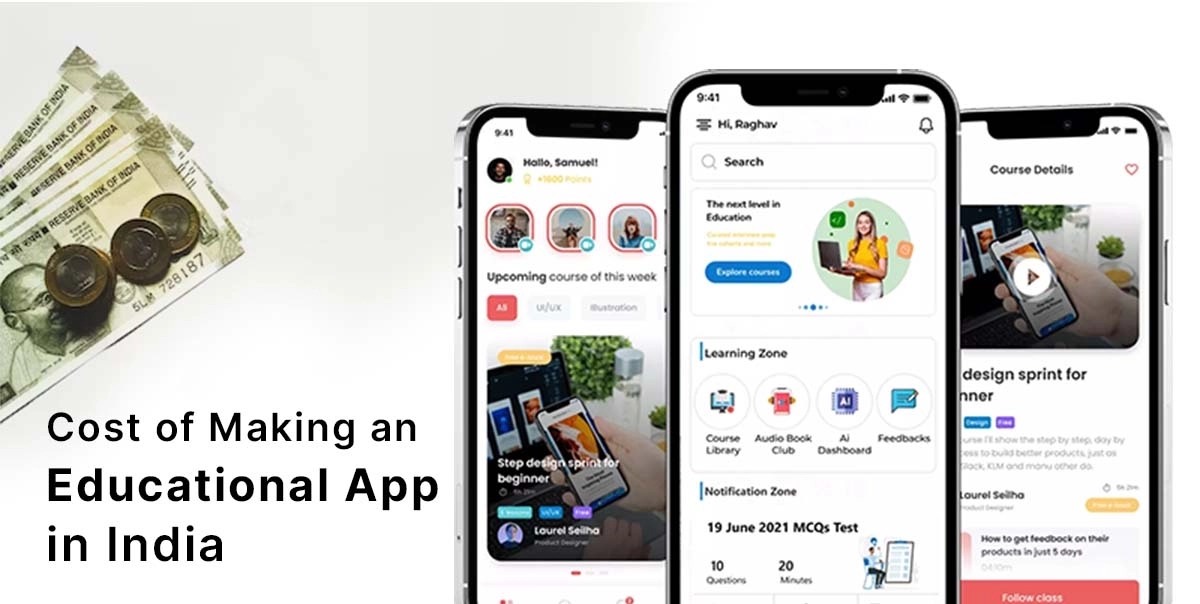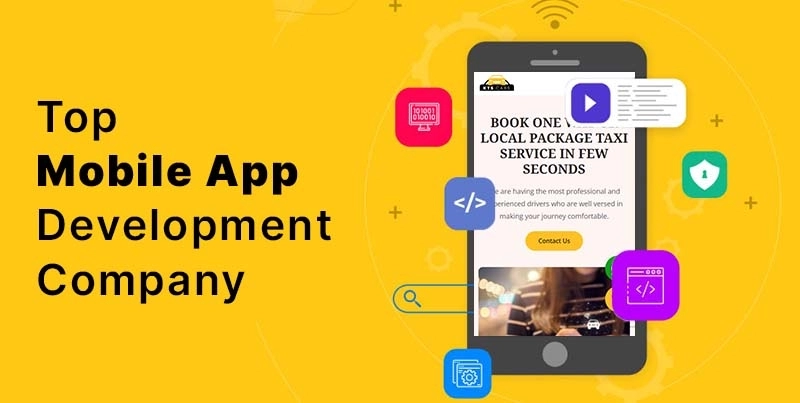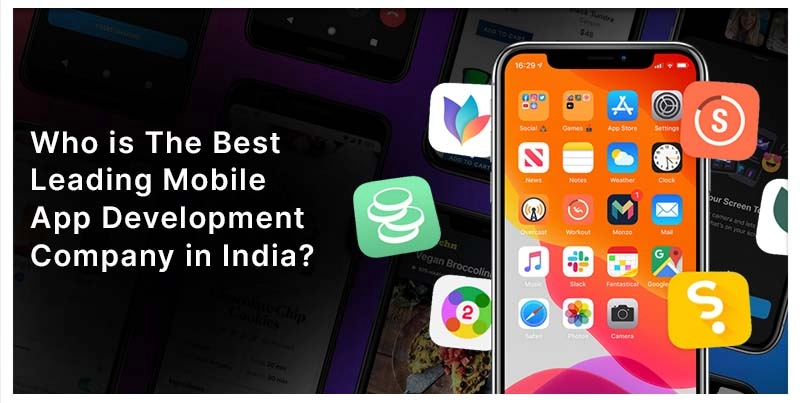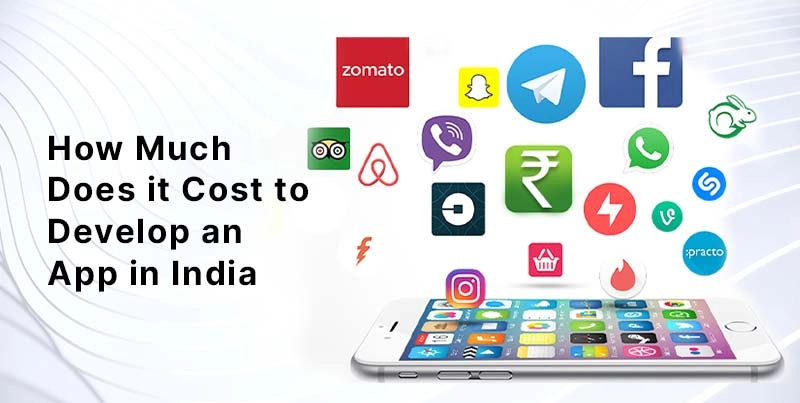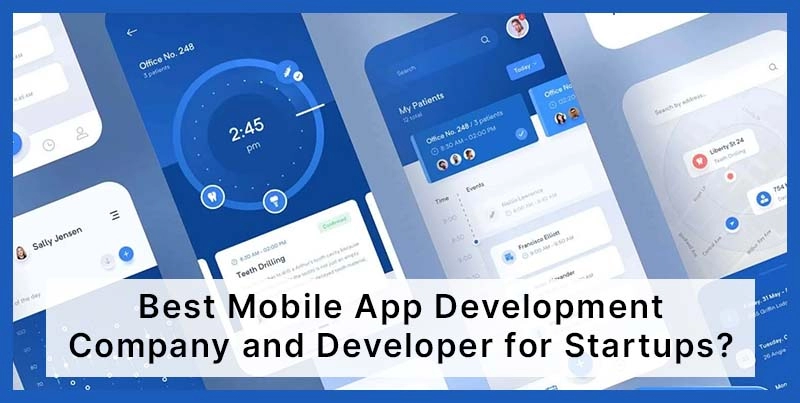Overcoming Common Challenges in Android App Development | Addressing Common Issues and Problems in Android Development

Posted By : Ambesh Mishra, Posted Date : Jul 27, 2024
Top Common Challenges in Android App Development and Their Solutions
There are several Android app development challenges that a developer needs to take care of for successful deployment and the satisfaction of the users. The development challenges in Android apps may relate either to compatibility across a variety of devices and different OS versions or optimization of the performance of apps; and lastly, security concerns. To overcome Android development problems, most developers make use of typical issues in apps, such as substantive testing, best practices in coding, and strong frameworks like Flutter or React Native.
These are the major Android development problems that need to be understood for developing stable and scalable applications. One major way to improve app quality and reliability is by focusing on comprehensive testing strategies and updated Android SDK versions, then solving challenges in Android app development early in the development cycle.
Table of Contents
- Common Issues in Android Apps: Solutions for Developers
- What are the biggest Challenges in Android App Development?
- How difficult is Android app development?
- What are the major challenges faced by Android app developers?
- Top-10 Common Android Problems and How to Fix Them
- Why select Duplex Technologies?
Common Issues in Android Apps: Solutions for Developers
While developing apps for Android, quite a few times, common issues in Android apps come to the forefront. These may be performance bottlenecks, compatibility issues, or even UI/UX inconsistencies across devices. Such challenges should be mitigated with proactive strategies by using Android development problem-solving techniques.
Know the nuances of Android fragmentation, performance optimization of code, and strong security measures to master the challenges of Android app development. By imparting this solution, a developer will be well-equipped with solutions for common issues in Android apps and achieve frictionless user experiences.
Get Solutions for Android Development Problems at Duplex Technologies
The development of Android has a number of unique problems. There are some common Android development problems, which mainly include an app's performance optimization, compatibility management with various devices, and security vulnerabilities. In this case, tips and tricks from experts may turn out to be handy. From embracing efficient coding practices to using high-end debugging tools, handling some very common issues in Android apps can be made easy if there is a strategy and proper planning involved. Armed with the knowledge of new trends and best practices in the challenges of Android app development, our developers can groom themselves even better to come up with high-quality applications.
What are the biggest Challenges in Android App Development?
At Duplex Technologies, we deal with various challenges innovatively and smartly. Device fragmentation is one of the major ones. There are tremendous differences in Android devices pertaining to screen sizes, hardware specifications, and OS versions. This, of course, will involve rigorous testing and adaptation to make sure the app is compatible across the board. The other critical challenge includes security concerns: In comparison with other mobile platforms, Android apps have massive vulnerabilities in data leakages and malware; hence, extra robust security has to be implemented, including encryption and secure APIs. Optimization of performance remains equally critical. Balancing the functionality of app usage with resource effectiveness is quite a time-consuming task, essentially requiring good coding and testing practices. UX design is in the same category: developing intuitive UI across a host of devices while respecting Android design guidelines for enhancing app usability and customer satisfaction. Proactive handling of the forthcoming challenges proves how Duplex Technologies assures the end quality of work with regard to Android application development: secure, powerful, and user-friendly solutions that suit clients' needs.
How difficult is Android app development?
Developing an Android app test requires that the challenges encountered be handled in a more professional way: systematic and proactive in solving problems. The common problems that a developer should anticipate and handle in Android apps include memory management, inconsistencies in user interface design, and complexities in the integration of backends. Developers can speed up the process of resolving Android development problems by introducing agile methodologies, rigorous testing, and applying scalable architectures that ensure apps are runnable, solid, and user-friendly on every Android device and version.
What are the major challenges faced by Android app developers?
There are so many kinds of Android devices available, which have different screen dimensions and, at the same time, a different OS, so again, it becomes difficult to test the app on all of them. Second, security is always a big concern as the apps are always on the radar of hackers. Third, the process of updating an app with the latest features and fixing bugs is continuous. Fourthly, one has to make sure that the app is running smoothly without eating up so much battery or slowing down the phone. And lastly, an easy-to-use and good-looking app is also a major challenge to its design.
Top-10 Common Android Problems and How to Fix Them
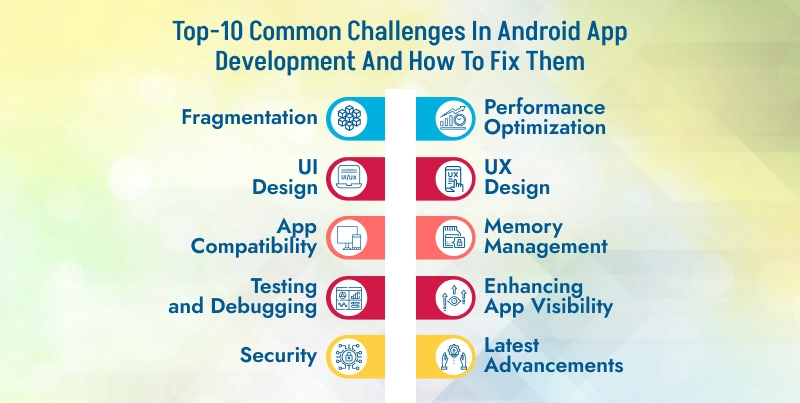
There are several problems that a developer often faces during the phase of development for a mobile application. Here are some common problems and their solutions to guarantee Android app development success:
1. Fragmentation
- Challenge: Android devices differ in their screen size, hardware, and OS version. Developers have to manage how to work out the app with all these, as they threaten to render its user experience very fragmented.
- Solution: Responsive design is to be applied to adjust the application with respect to the different displays and test it with various devices for compatibility. Active updating and user feedback can also help contain fragmentation.
2. Performance Optimization
- Challenge: How to make sure that the app runs smoothly and doesn't slow down a phone or overuse its battery is pretty hard. If there is generally poor performance, this will kill customer satisfaction and yield bad reviews.
- Solution: Optimize the code of the app, manage resources efficiently. Test regularly for performance problems to ensure the app is smooth. Use performance monitoring tools to facilitate fixing any issues identified in good time.
3. UI Design
- Challenge: Making an interface both beautiful and user-friendly is a Herculean task. The developers should keep in mind various kinds of devices and different usage preferences of the users.
- Solution: Apply Android design, use plainly simple layouts, and include user feedback for improvisation in the look and feel of the app.
4. Security
- Challenge: The application must be secured against hackers, and user data must be kept safe. Safety breaches result in the loss of a user's trust, which leads to various legal issues.
- Solution: Implement strong methods of encryption; update the app frequently with security patches; implement secure coding practices; follow the best practices to implement safety features into the application. Regular audits are also essential for checking and fixing vulnerabilities.
5. App Compatibility
- Challenge: Difficulty in making the application backward compatible with every Android version as it has updates very frequently. Some users cannot use the new functionality of the application because of incompatibility issues.
- Solution: The testing of the application on various versions of Android, with backward compatibility features built into the app and frequent updating of the app, ensures that the app does not face compatibility issues. Users can provide feedback on compatibility issues.
6. Memory Management
- Challenge: Memory management of the app should be done in the right manner so that it does not result in crashes or slow performance. Poor memory management makes the user have a bad experience and leads to uninstallation.
- Solution: construction of efficient coding techniques that allow the release of unused resources, checking for leaks through regular testing, monitoring, and management of memory usage by profiling tools for sustained performance.
7. Testing and Debugging
- Challenge: The time and effort required to manually find and fix the bugs within the app increase when complex features are developed for a multitude of devices.
- Solution: Apply automated test tools and test on several devices; debug regularly to find out and fix issues quickly. Continuous integration and delivery practices can help maintain the quality of apps.
8. Enhancing App Visibility
- Challenge: With the crowded nature of app markets, it is tough to make an app stand out. In the case of low visibility, it may not attract many downloads, and user engagement can become limited.
- Solution: Listing of your app should be optimized with good keywords, eye-catching icons, and screenshots. Engage through social media and other promotional activities. Users can be encouraged to post reviews and ratings to increase the visibility of the app
9. UX Design
- Challenge: Great user experience for all, yet this is somehow very difficult. Many times, low in-app retention is a result of poor user experiences.
- Solution: Simple navigation with clear instructions and constant design. Feedback from users is needed for continuous improvement. Regular usability testing can also help fine-tune the user experience.
10. Latest Advancements
- Challenge: Keeping up with technology and trends in app development can be time-consuming yet very relevant. Missing out will make the app less competitive.
- Solution: Keep yourself updated on industry news, attend workshops, and upgrade your skills to keep current with new developments and features in the area of app development. Share knowledge and learn from others within the developer communities.
These are the various solutions, as mentioned above, on how to avoid challenges of Android app development.
Why select Duplex Technologies?
Here are some of the reasons why you should select Duplex Technologies for your Android app development needs:
- Android App Development Expertise: With a team of highly skilled and veteran developers, they have deep experience in Android app development challenges, fixing everyday problems in Android apps on various domains.
- Proven Record of Success: Duplex Technologies has already established the fact that it is a reliable and consistent Android application provider across versatile industries with regard to surmounting Android development problems.
- Innovative Solution: Being at the forefront of technological innovation, Duplex Technologies incorporates the latest tools and frameworks in their efforts meant for efficiently handling the challenges pertinent to Android app development.
These are the various reasons, as given above, to select Duplex Technologies.
Contact us for Android App Development Needs- +91- 9452000089
Get in touch with Duplex Technologies today at +91-9452000089 or browse our Duplex Technologies website for expert solutions to Android app development challenges, the more common issues in Android apps, and Android development problems.

